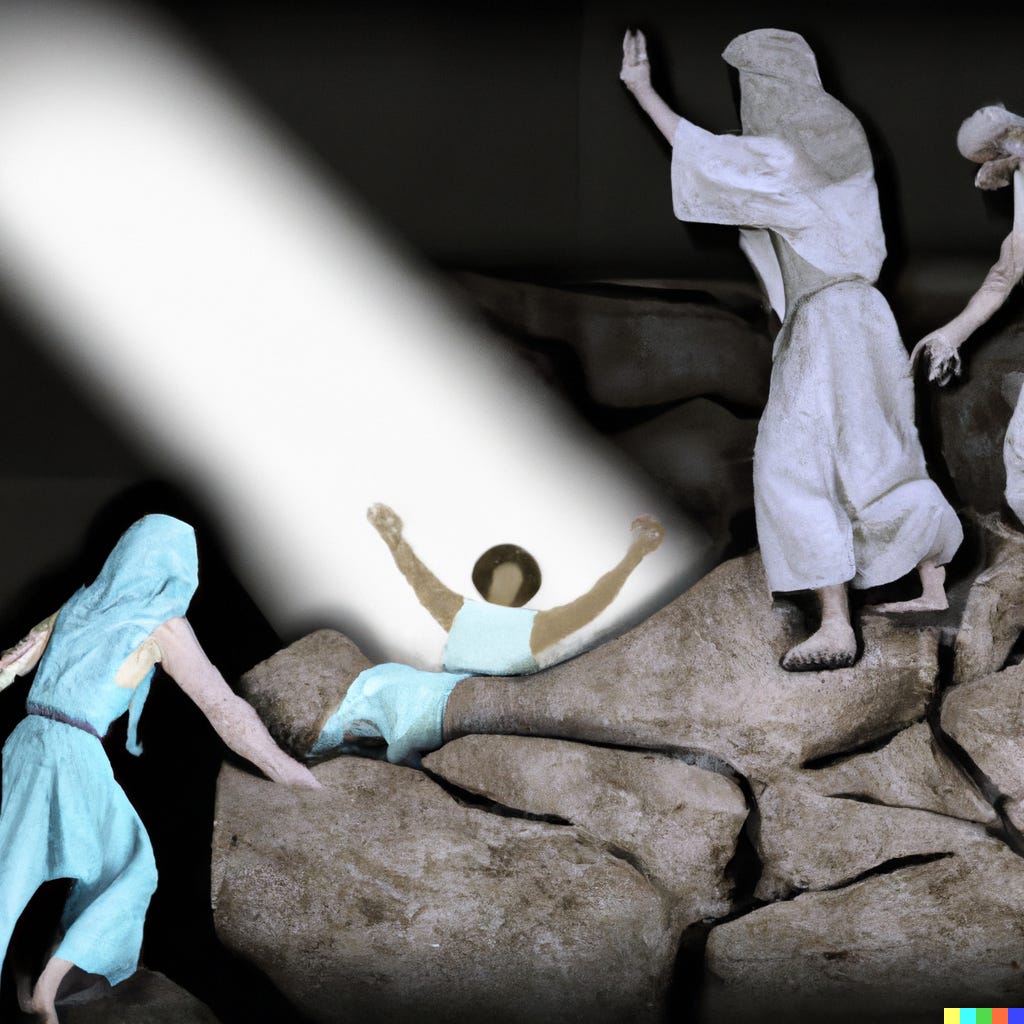Vayeshev Parsha Thoughts #2
On [Second to Nun]'s bar mitzvah
While looking through Shadal on Vayeshev, something he said struck me. He was discussing the sale of Yosef, and the question of just who did the pulling of Yosef out of the pit and selling him to the Yishmaelites? Was it the brothers, or was it the Midianites?
To resolve this, and to understand the competing narratives, we’d have to explore a whole lot of pesukim. I’m not going to go into great detail here, put one pivotal verse is this one (Bereishit 37:28):
וַיַּֽעַבְרוּ֩ אֲנָשִׁ֨ים מִדְיָנִ֜ים סֹֽחֲרִ֗ים וַֽיִּמְשְׁכוּ֙ וַיַּֽעֲל֤וּ אֶת־יוֹסֵף֙ מִן־הַבּ֔וֹר וַיִּמְכְּר֧וּ אֶת־יוֹסֵ֛ף לַיִּשְׁמְעֵאלִ֖ים בְּעֶשְׂרִ֣ים כָּ֑סֶף וַיָּבִ֥יאוּ אֶת־יוֹסֵ֖ף מִצְרָֽיְמָה׃
When Midianite traders passed by, they pulled Joseph up out of the pit. They sold Joseph for twenty pieces of silver to the Ishmaelites, who brought Joseph to Egypt.
Who are “they”? Midianites or brothers? It is an ambiguous antecedent. Rashi says the brothers while Rashbam says the Midianites, without the brothers’ knowledge. Shadal writes:
רוב העולם מאמינים כי אחי יוסף מכרו אותו, ורשב"ם כתב כי לא כן היה הדבר ואחריו החזיק החזקוני
“Most of the world believe that the brothers of Joseph sold him, but the Rashbam writes that this was not so, and the Chizkuni agrees with him…”
Depending on what circles you frequent, I think the situation nowadays has been reversed. In modern times, midrash has been shunned and peshat is ascendant. And people teach peshat in schools, and it is understood as the real meaning. And people teach this Rashbam in Modern Orthodox schools, as the correct and historical meaning of the Biblical text.
The fact is, neither version works flawlessly, without any bumps. People in the Rashbam camp will attack the Rashi interpretation with objections such as, where did Reuven go, that he was surprised that Yosef had been sold? But there are weaknesses in the Rashbam interpretation as well. For instance, Yosef explicitly says to his brothers (in Vayigash) that his brothers sold him into slavery in Egypt:
אֲנִי יוֹסֵף אֲחִיכֶם, אֲשֶׁר-מְכַרְתֶּם אֹתִי, מִצְרָיְמָה
and Rashbam needs to handwave it away, that their actions indirectly caused him to be sold.
I am firmly in the Rashi camp, though I don’t interpret every pasuk the same way Rashi does. (See my lengthy explanation in parts one, two, three, four on parshablog.) Briefly, I see the ambiguous antecedent as just that, ambiguous. And I see Midianite and Ishmaelite as synonyms, rather than two separate parties. And local to Vayeishev, I see us primed for the brothers selling him — that is after all Yehuda’s proposal — and then them following through with that plan. Something I haven’t mentioned before, but another bit of evidence I find compelling is this:
וַיִּמְכְּר֧וּ אֶת־יוֹסֵ֛ף לַיִּשְׁמְעֵאלִ֖ים בְּעֶשְׂרִ֣ים כָּ֑סֶף
Why focus on the price, of twenty shekels? I would say it is to increase the betrayal, to focus on the money they received. If the Midianites received that money, who cares how much they got?
I thus believe that both approaches are actually peshat.
These competing narratives makes me think of Scott Adams (the Dilbert cartoonist) who often talks about Two Movies playing on One Screen, for instance in his book Win Bigly, in the chapter “When Reality Bifurcated”. The same image and sound is projected on the screen, but different audiences perceive it differently based on their prior assumptions and their way of looking at the world. In interpreting Biblical literature, as in life, we can look at the same evidence and experience it in very different ways.
We should be wary of following popular trends, think for ourselves, and actually weigh the merits of even unpopular approaches, to try to see what they see.
(There’s also a third possibility — the multivalence often championed by Rabbi Nachman Levine. In this approach, a verse is written deliberately in an ambiguous way, which would reasonably spark two interpretations. The reader is supposed to feel the tension and experience the nuance and ambiguity. Here, does Yosef realize who sold him? He may have been confused and disoriented in the moment, and thus the ambiguous antecedent in Vayeishev, and the assumption that they sold him in Vayigash. It is always good to appreciate nuance and recognize the ambiguities in life.)


